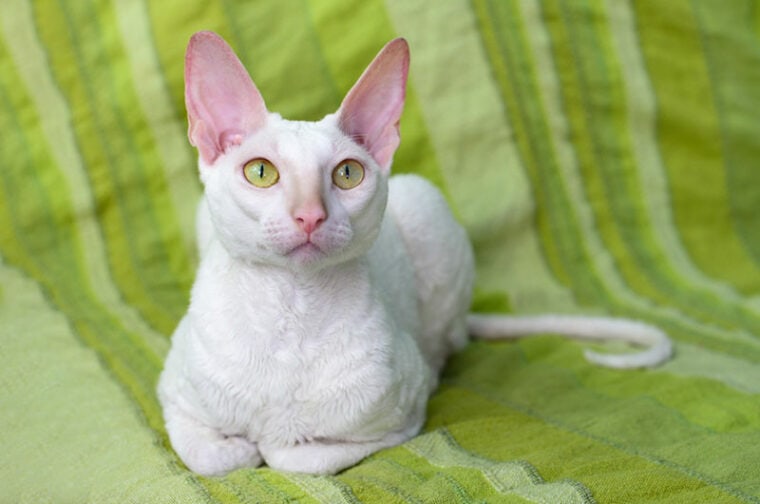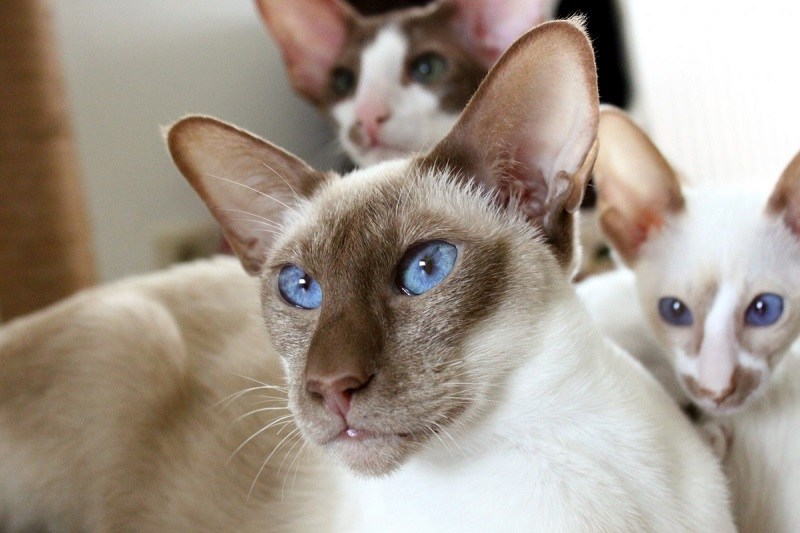
Click to Skip Ahead
Is there anything worse than loving cats but having to do it from afar due to allergies? If you’re desperate to become a cat parent but suffer from pet allergies, you’ve probably run into the myth of “hypoallergenic” cats. The truth is that no cat is hypoallergenic, but some breeds will aggravate your allergies less than others.
So, if you’ve been eyeing a Cornish Rex and have read that the breed is hypoallergenic because they have less fur, unfortunately, it isn’t true. However, the Cornish Rex might be a bit easier on your allergies. Why is that? Keep reading to discover whether this kitty will make your allergies flare up and why the Cornis Rix isn’t truly hypoallergenic!
What Is a Cornish Rex?
The Cornish Rex is known for its short, curly hair (caused by a recessive gene and the reason people believe they are hypoallergenic) and its small, dainty stature. Don’t let their small size fool you, though! This cat breed might seem like they’d be too delicate to play rough, but in truth, the Cornish Rex is an amazingly agile and athletic cat with a love of jumping and acrobatics. This breed is known for their high energy, so be prepared for continuous antics with this kitty!
Despite their love of playing and jumping about, the Cornish Rex still loves to be picked up and cuddled. They’re also a breed that will insist on helping you with everything you do, whether you’re working on the computer or washing the dishes. This is one friendly cat who will shadow you wherever you go.

Why Do I Have Cat Allergies?
As we said before, people tend to think they experience allergic reactions to cats due to their fur. But it isn’t the fur itself that causes your allergies; rather it’s a protein known as Fel d-1 found in cat saliva, oils on the body, and urine that causes an allergic reaction. So, why does it seem as if it is shedding fur that’s the cause of allergic problems?
Think about how often a cat grooms itself (it’s a lot!). Licking their fur all the time means that their fur is covered in saliva, which carries the protein that causes allergies to flare up. The saliva dries and the protein becomes aerosolized, meaning that we can then breathe it in. When fur sheds, so does that dried saliva. This fur gets throughout your home, into your vents, on your clothes—pretty much everywhere!—which means you’re constantly breathing it in and touching it. Hence allergic reactions.
Is the Cornish Rex Suitable for Allergy Sufferers?
Whether a Cornish Rex is suitable for you and your allergies really depends on how bad your allergies are. All cats produce the protein that can result in allergic reactions in people that suffer with this allergy, so the Cornish Rex will aggravate allergies. Even though the breed only sheds minimally, meaning there’s less fur flying around your home, these cats still produce the Fel d-1 protein and therefore will still bother allergy sufferers.
Cornish Rex’ are curious cats who will explore every inch of your home, so they’re not a breed that will like to be kept in one section of the house, separate from their owner. Therefore, the Cornish Rex probably won’t work in a home with people who have severe allergies, and even those with mild allergies can still experience allergic reactions.

Can I Reduce Allergic Reactions to Cats?
If you still want a feline companion, despite your allergies, there are a few things you can do that will reduce how exposed to the protein that causes allergies you are.
Final Thoughts
The Cornish Rex is not truly hypoallergenic; no cat breed is. Although this breed sheds less due to having less fur, they still produce the offending protein in their saliva, which is the cause of the allergic reactions that some people suffer with. Therefore they may still cause allergic reactions as other breeds do. Whether the Cornish Rex will work with your allergies will depend on how mild they are. You can take some steps to reduce how exposed to allergens you are, which should help reduce the risks of allergic reactions. But don’t expect to never have an allergic reaction to the Cornish Rex; they still produce the protein that causes allergies, so it’s bound to happen at some point.
Featured Image Credit: Stramp, Shutterstock







